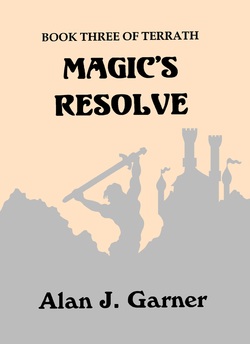
For the purpose of this blog I’ll limit the field to a working book title. This needs to reflect the essence of your tale, without being too revealing. Think of it as a fishing lure. Your book’s title is the bait; a plump, juicy worm wriggling seductively on the hook. Its sole job is to entice. And you the writer are fishing for readers.
A title needn’t be short to catch the eye. The Redemption of Althalus by David and Leigh Eddings is a mouthful true, but memorable nonetheless. That said, there’s nothing simplistic about Frank Herbert’s Dune. How else does a single word encompass an entire planet, conjuring up images of sandworms and spice?
Thus a story needs to be stripped of the superfluous so that only the essentials remain. What’s left is the core of your tale and from that you build a suitable title.
Take my fantasy series, Terrath. Originally intended to be one volume the story grew so much in the telling that I opted to divide it into a three parts. That decision presented new problems, amongst them what to name the individual books. Following my own advice, I broke each volume of the trilogy into its basic components and worked from there. Book 1 dealt with the oft conflicting efforts of Terrath’s wizarding fraternity, so Wizards’ Goal emerged as the most agreeable title. Without introducing unwanted spoilers, Enemy Winter aptly described the setting of Book 2, in which a snowed-in Carallord reels under the weight of invading Goblins. And Book 3? Well, when it’s completed I think Magic’s Resolve will say it all.
Before I sign off, let me share the story behind a certain fantasy author’s trials and tribulations with the title for the pivotal volume wrapping up The Lord of the Rings. Yes, that’s right. Even J.R.R. Tolkien experienced his fair share of troubles in this crucial area. He (quite rightly, in my humble opinion) envisaged the third instalment being titled The War of the Ring. After all, the overpowering desire to possess the One Ring embroiled all of Middle-Earth in its far reaching conflict. But Tolkien’s publisher had other idea s, wanting to release the conclusion of the trilogy as The Return of the King. Tolkien argued that the title gave away too much of the plot, ruining the reader’s suspense. In the end he was strong-armed and Unwin published it under the title familiar to us today.
So, in the end who was right or wrong? Whether you side with the slighted author or support the executive decision of a controlling publishing house matters little. The outcome speaks for itself. LOTR stands as the third bestselling novel in history and the highest grossing movie trilogy in cinematic history.

 RSS Feed
RSS Feed
